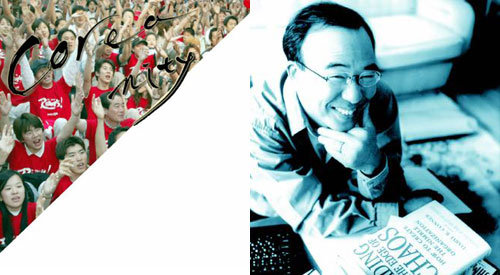From Follower to Leader

The author believes that the current stalemate and crisis are results of imitation. The engine that motivated us is dead. Korea has come as far as followers can go. The way for Korea to continue to prosper is for it to become a leader, from being a follower.
What are the resources that we can rely on for this path breaking?
The author urges use to make use of our heritage, to examine more closely the cultural DNA of Koreans and to create a Korean management model based upon the properties of it.
The soft power that Korea can attract the world with has been coined Coreanity. Coreanity is the cultural homogeneity and common denominator of everyday life that is like a mental map.
Using an American product makes you feel as if youre contributing to the American dream. German products give the image of perpetual sturdiness. Japanese brands are meticulous and detailed. For French products, a melancholic and luxurious aura is felt.
However, Korea has no international perception of its culture. Now is the time to differentiate and discover the worlds universality and wonders.
This book represents the 21st century business management theory of the author, who practices changing management professionalism. His management philosophy, which has been defined from the overlap points of the humanities and business management studies is: If you dont know people, there is no management.
The author seeks the core of Coreanity from the warm and dynamic relation-revolving communalism in the Korean culture that has a tendency to revolve around relationships.
There is me in us for Koreans. In a community, there is individual identity. Koreans are positioned between American individualism and the Japanese group mentality. Its difficult for us to live with relationships. But then again, we are too dynamic to stay buried in those relationships. We waver between the notions of group and individual and balance out and harmonize the friction in between.
The author picks keywords that determine 21st century future organization operations and individuals such as globalization, technology, speed, intellectual property, intelligence, customer-orientation, and continuous growth. He focuses on these core concepts and the common features they share with Coreanity.
Korean CEOs have enjoyed saying, Human resources are everything. This phrase has been driven out due to Americanized functionalism, but in the upcoming era, these words will take on new power.
The crux of the 21st century, human resources management, provides cultural advantages to Korean executives. What the West must learn is already embedded in our cultural DNA. The words of Canons lifelong employment system: Even if the company is abandoned, people will never be thrown out, even in times of crisis, warms the heart.
Mogul Lim Sang-ok from the Joseon dynasty once said, Business doesnt leave profits; it leaves people!
Gi-U Lee keywoo@donga.com
Headline News
- Joint investigation headquarters asks Yoon to appear at the investigation office
- KDIC colonel: Cable ties and hoods to control NEC staff were prepared
- Results of real estate development diverged by accessibility to Gangnam
- New budget proposal reflecting Trump’s demand rejected
- Son Heung-min scores winning corner kick







